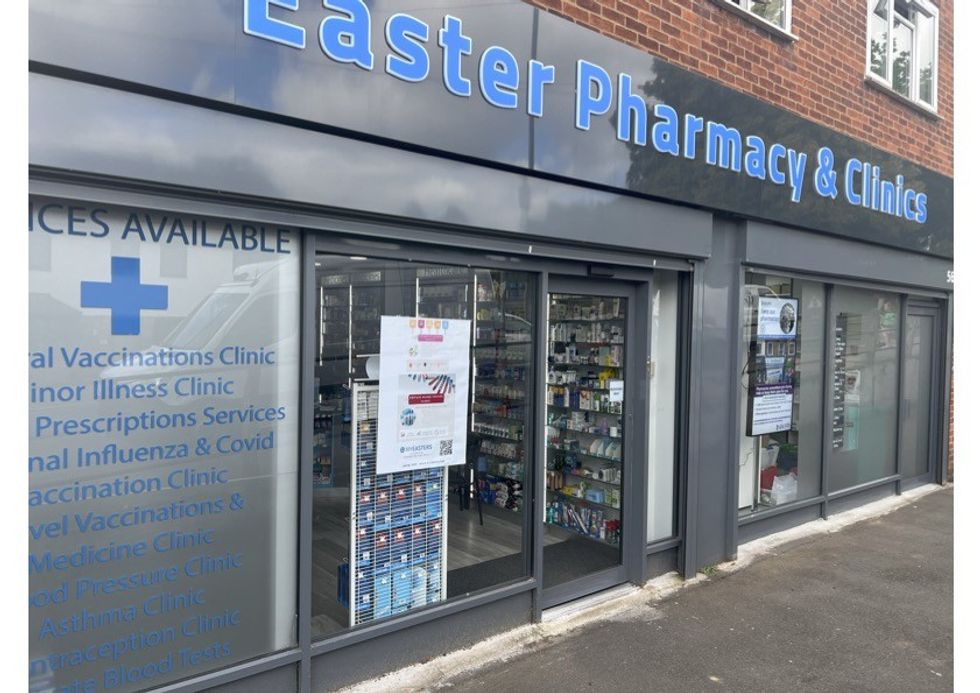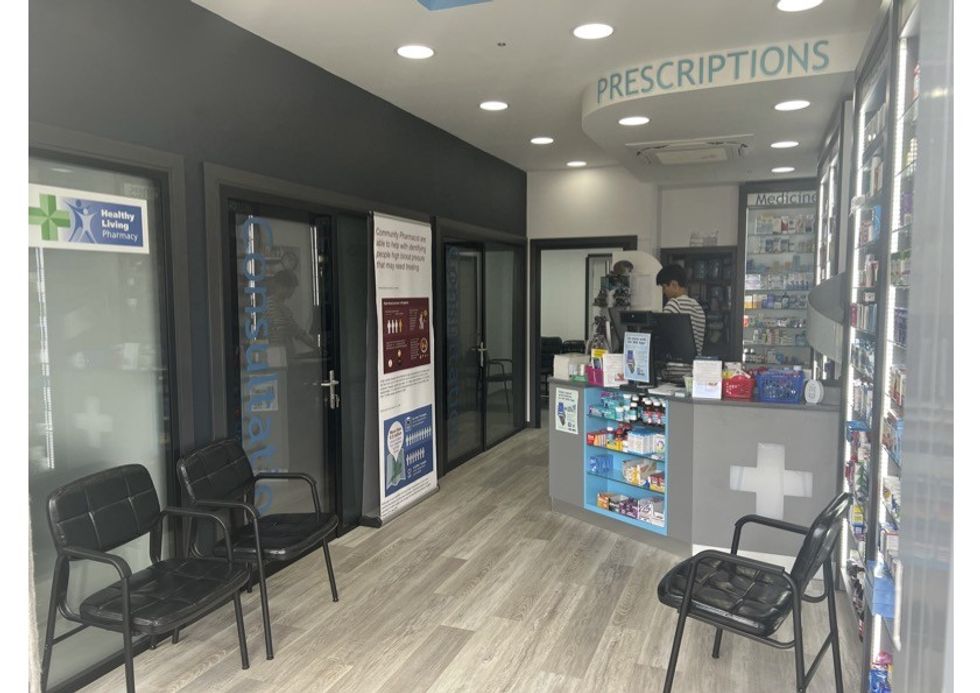Fostering a strong relationship between pharmacists and GPs can help resolve many issues in primary care, particularly regarding access to appointments and urgent care.
With this belief, Babatunde Sokoya, pharmacist superintendent at Easter Pharmacy, in Buckhurst Hill, Essex, aims to further strengthen collaboration with local practices and position his pharmacy as a leading example of integrated pharmacy service nationwide.
Easter Pharmacy was awarded the Pharmacy Clinical Excellence Award 2024, recognising it as the best all-round pharmacy for its development and delivery of NHS and private clinical services.
With 30 years of experience across various primary care sectors, Sokoya has continuously adapted his pharmacy to align with the evolving role of pharmacists.
Babatunde attended Obafemi Awolowo University Nigeria to study agriculture but switched to pharmacy due to his passion for chemistry and a desire to help people.
After working for Lloyd's Pharmacy for 10 years, Babatunde bought Easter Pharmacy in 2005, which has been running successful for nearly 20 years now.
Reflecting on his journey, he told Pharmacy Business: “The decision to have my own business was the best move I ever made.”
In 2023, he refurbished the pharmacy, expanding into the shop next door to create a dedicated dispensary and increase services.
He also added four consultation rooms and installed a BD ROWA robot, despite the pharmacy dispensing only 5,500 items.
“The investment in the robot was principally to free up time for staff to deliver other services and spend more time with the customers to help them make the right health choices,” Babatunde explained.
He also removed any non-healthcare related products from their stock holding to make room for additional consultation rooms and reduce staff time spent on non-essential items.
This shift allowed his pharmacy teams to focus on services like NHS and private consultations, which generate significantly higher revenue.
For example, he said, a contraception consultation pays £18, compared to just £1.27 for a prescription.

Consultation Services
“Running after prescription items is not the way forward,” said Babatunde, emphasising that with upcoming NHS changes in April, services such as hypertension management, Pharmacy First, and contraception will be bundled together—potentially costing pharmacies £1,000 per month if they choose not to participate.
He said that investing in consultation services not only increases revenue but also help pharmacies integrate fully into the primary care team.
Post the refurbishment, Easter Pharmacy has seen a 30% increase in OTC turnover, with more patients coming in for private services, along with an increasing number of referrals from GP practices.
“We've been able to offer a wider range of services, including ear micro suction, which has been quite popular. Additionally, we provide a light, ear otoscopy service under Pharmacy First, enabling us to capture images and videos using our otoscope equipment.
“GP practices are so impressed by this capability that they now refer patients with ear-related issues to us because we can obtain images that they cannot as they would use the normal otoscope,” Babatunde said.
Following the refurbishment, dispensing errors have become negligible and both patient and staff satisfaction have improved, with patient numbers and items increasing.
Pharmacy First Success
For Easter Pharmacy, reaching the Pharmacy First monthly thresholds is not a difficult one, with 70 PF consultations conducted each month.
Babatunde underscored that building the relationship between GPs and community pharmacists is key to improving services and outcomes.
"It’s not always easy, but to improve that relationship you need to go and talk to the GPs to understand their issues. A lot of the times the problems are historical and there are misunderstandings. The pharmacist may have a certain view of the GP, and the GP may have their own perspective on the pharmacist."
He believes that if pharmacists and GPs can collaborate effectively, it will significantly improve access to appointments and urgent care in primary care.
As a member of the local pharmacy council, Babatunde has made a pledge to advocate for the extension of ear care service.
“My goal is to see patients with issues like blocked ears or ear pain referred directly to pharmacies instead of GPs, as these cases can be effectively managed within community pharmacy settings.”
Babatunde welcomed the government’s proposal to expanding non-surgical ENT services in community pharmacies as part of its elective care reform plan.
Easter Pharmacy offers a range of services, including all essential and advanced services, private phlebotomy, ear microsuction, private medication reviews, health checks, a travel clinic, and weight management support.
Weight loss service is one of the high-demand private services in Easter Pharmacy, with about 40 people receiving treatment at the moment.
Babatunde strongly supports face-to-face consultations before starting the treatment because he says, “weight loss is a complex issue, with genetic, environmental, physical, and mental factors at play.”
Upskilling Staff
Easter Pharmacy employs five full-time and five part-time staff, including two pharmacists, with a third available on Tuesdays and Thursdays.
Babatunde highlighted that expanding the team has allowed them to meet patients' needs more efficiently and collaborate closely with local practices on innovative approaches to care.
Some may argue that hiring a pharmacist is expensive, but Babatunde said, “if you do all the services that are available, you'll cover the cost.”
He believes that upskilling staff is crucial. All his team members are enrolled in training to advance their roles as technicians or accredited checking dispensers.
Additionally, they are undergoing Healthy Living Pharmacy Level 3 training, which includes services like substance misuse, smoking cessation, and weight management.
“A key part of this programme involves training staff to be more proactive. This ensures that when people visit, staff can raise awareness about available services, such as blood pressure checks and general health screenings,” Babatunde asserted.
Personal Achievements
Babatunde has served as a member of the Clinical Pharmacy Leadership Network, focused on shaping the future of pharmacy services, particularly for independent prescribers.
Recalling his experience as a member of the Network, he said: “I was nominated by my Integrated Care Board, and the network was basically looking to inform what 2026 is going to look like, when all pharmacists graduating will be independent prescribers.”
“The network seeks to understand the best-case scenario and encourage contractors and colleagues on the optimal path forward.”
Easter Pharmacy has been selected as the only IP Pathfinder site in West Essex to demonstrate how independent prescribing community pharmacist can impact hypertension, asthma and minor ailments.
Babatunde strongly believes that by 2026, hypertension could be the first condition to be fully managed within community pharmacies.
This would involve conducting blood pressure checks, performing ABPM to confirm a diagnosis, and prescribing medication when necessary.
As part of the IP Pathfinder site, Babatunde would be able to prescribe medication, if needed. The service is expected to begin in the coming months.
He has served as a Pharmacy Integration Lead, working alongside colleagues at the PCN and ICB levels to showcase the potential of community pharmacy.

Future Expansion
Looking ahead, Babatunde plans to expand his business, potentially taking on another pharmacy in the next six months.
“I've always dreamed of having two pharmacies,” he shared.
He also aims to establish fully operational hypertension and asthma clinics in the next two-three years, demonstrating the vital role pharmacists can play in primary care recovery.
Babatunde envisions expanding services in minor ailments, ENT, and urgent care to reduce A&E visits, as “30 to 40 per cent of people that attend A&E could easily be dealt with in a pharmacy.”
He stressed the need to raise public awareness about pharmacy services and eliminating barriers to enable direct access to pharmacy care without requiring GP referrals.
A Request to Policymakers
Babatunde urged policymakers to fund initiatives that foster better working relationship between GPs and pharmacist, particularly face-to-face meetings to build trust in local neighbourhoods to allow a better understanding of each other’s role.
He calls for funding "work in my shoes project" allowing GPs to spend time in a pharmacy and pharmacist to spend time in a GP practice to get a better understanding.
“The funding should have SMART objectives.”
Additionally, he advocates for rewarding innovative projects where both have collaborated to increase patient safety, value and save money.
He believes that if GPs and pharmacists fully engage in these initiatives, the benefits that follow will be immense.
He calls it as "Principle-Centered Leadership" and emphasises, “Adopt the right principles and the rewards will follow.”
With the pharmacy contact negotiations ongoing, Babatunde emphasised the importance of ensuring fair reimbursement for dispensed medicines to prevent pharmacies from operating at a loss and to maintain financial sustainability.
He expects to see more funding shifted towards pharmacy services, which has been the direction of travel for the last 10 years.
Embrace Tech
To be able to sustain and thrive, Babatunde urged pharmacy contractors to focus on ensuring that they are delivering all the services that are out there for them to deliver.
While he acknowledged that there's workforce issues and staffing issues, he said “we've got to start somewhere.”
“We need to use technology and ensure that staff are fully aware and trained to the highest level, enabling them to help deliver services effectively,” he said.
“Too often, we assume that some staff may not want to train, but having appraisals and open conversations can help them see that primary care pharmacy is evolving.”
The whole Integrated Care System is advocating for the "left shift," which is moving care closer to home, and Babatunde believes pharmacies can play a pivotal role in this transition.













